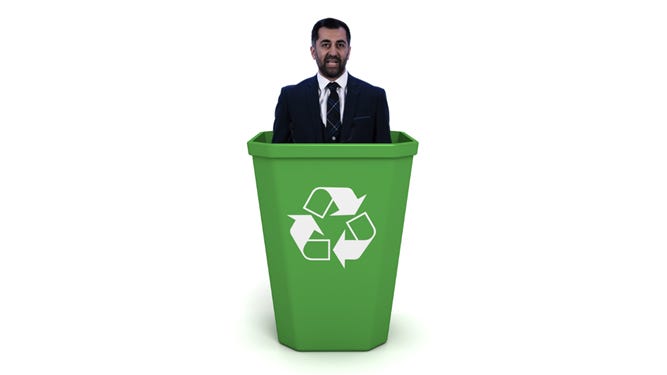Ad Nauseam
The First Minister's ridiculed recycled New Year's speech shouldn't be rebutted. It can simply be reframed.
An argumentum ad nauseam is a logical fallacy where a person without evidence for their argument makes a claim over and over hoping that repeated assertion eventually becomes proof.
This is worth keeping in mind as the First Minister makes his New Year fight-back speech today. In particular, this passage that was briefed to the press in advance:
“If we use the same analysis for countries that are similar to Scotland – such as Denmark, Ireland and Finland - the difference for the typical Scottish household would be even greater. They would be £10,200 better off.”
People remember that in 2014 the Independence White Paper promised us we would be £600 better off. When that didn’t transform things they upped the figure to £2,700. In the closing days of the referendum, they dialled it up to £5,000. Nicola Sturgeon’s Growth Commission offered us £4,100.
Like a dog returning to its own vomit, today the SNP will try to same argument again.
This time they’ll offer £10,200. Talk about inflation!
It’s not just the figures that have been repeated but the process through which they have calculated it. In 2006, 2007, 2009, twice in 2013, and more times; than can, be counted in 2014, they used the same model.
It didn’t work before their referendum defeat but they weren’t deterred and tried it again in 2018 and in 2022. They are beginning 2024 by recycling this failed argument.
They pick a random group of countries and claim Scotland could be like them without any sense of how we get from where we are now to there - or for that matter without choosing which of the many countries’ models we’re meant to be choosing.
A Weak Argument from a Weak Leader
Having knocked hundreds of doors in the last few weeks it is clear that the hardcore SNP base is demotivated and the swing voters don’t believe that the change they offer can be delivered by a party in crisis. These are problems of credibility. Making ever more extravagant claims deepens that problem, it doesn’t solve it.
If you doubt my analysis, it is shared today by Alex Neil in the Daily Record who has clearly been out on the doorstep too:
“…in their view, the SNP has abandoned any pretence of trying to get independence anytime soon, so they're voting Labour - because if we're not going to get independence, they want rid of the Tories. That message is cutting through, even among strong independence supporters. The new priority is to get rid of the Tories as they don't see any progress on independence."
The response to Yousaf’s desperate relaunch shouldn’t be to rebut the canard at the centre of his speech. Doing so for an ad nauseam argument that hasn’t worked in the past, and which makes a leader lacking credibility even less plausible anyway, isn’t necessary. Precisely because this is an argument that has been repeated and rebutted repeatedly over the last twenty years, voters have already been provided with the counter-framing within the constitutional debate anyway.
Engaging in the fantasy policies in Yousaf’s speech helps him to communicate the fiction that the independence movement is going anywhere. Instead the response should be around the process story rather than the policy one.
Yousaf’s recyled argument is so poor that it plays into alternative framing which shifts the debate away from dead-end independence arguments: this is really about Yousaf’s weakness and the SNP’s falling support.
Kate Forbes is preparing a leadership challenge after he loses seats to Labour. This isn’t a speech about the future of Scotland. This is a speech about Humza Yousaf’s future job prospects. This relaunch isn’t about energising the case for a separate Scottish state - nobody believes that is happening any time soon and he’s offering no new leadership anyway. This is about trying to shore up his support within the SNP.
In the past SNP leaders have given speeches about independence to build on momentum. Today Yousaf gives a speech about independence because he has lost it.



